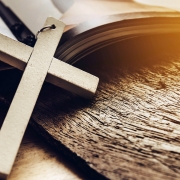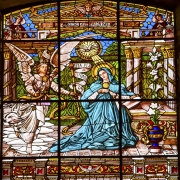Homily for Fifth Sunday of Lent
I’m finally catching up. Not on Netflix. Honestly, I’m so overwhelmed by the selections of that service that by the time I’ve selected something, I don’t have time to watch it before the hour that I want to get to bed. So I’mvcatching up on: rest, books, my bike, yard work. I hope that you’re finding blessings in this difficulty.
A difficulty it is, yet such trials are not far from God’s generous mercy. “ThevLord is compassion and love, slow to anger and rich in mercy; his wrath will come to an end: he will not be angry for ever. As a father has compassion onvhis children, the Lord has pity on those who fear him.” (Ps 103:8-9)
May be we don’t see the firm hand of a loving Father in all this. I think thatvthis pandemic has His signature. We can take a clue from God’s first reaction to His people’s lack of faith, “How long will they refuse to believe in me despite the signs I have worked among them? I will strike them with pestilence and disown them.” (Numbers 14:11-12) Moses intervenes and wins a reprieve. Yet throughout the course of their history, their infidelity is met by various calamities sent by God to bring them back to their senses and once more to His protective care from worse things and blessings.
Also it is interesting to me that in the Old Testament, the object of God’s wrath that most poignantly gets Israel’s attention is anything to do with the Temple. The Temple was built by King Solomon to house the Ark of the Covenant. It replaced the tabernacle or tent that was the Ark’s home during the years of wandering in the desert. It became the center of Jewish identity and practice of the faith. Before this permanent abode for the Ark, the Ark was the source of Israel’s confidence. They would win battles with the Ark in their midst. (This why the Nazi’s wanted it in the movie Raiders of the Lost Ark.) As time progressed Israel began to get complacent. Instead of reforming their lives according to the covenant that the Ark represented, they began to think that as long as they had the Ark, they would be o.k. So in the First Book of Samuel we see how God lets the Ark fall into the hands of the enemy in a lost battle with the Philistines. It doesn’t remain with the Philistines for long. They hand it back to Israel after they are plagued by a strange pestilence. (1Sm 6) (I don’t why the Nazi’s didn’t read that part of the story.)
Because of this, David who succeeds the first king, Saul, was rather uneasy about bringing the Ark into his city. “David feared the LORD that day and said, “How can the ark of the LORD come to me?” So David would not have the ark of the LORD brought to him in the City of David, but diverted it to the house of Obed-edom the Gittite.” (2Sm 6:9-10) Later it was revealed to David that his son, Solomon, would build the Temple for the Ark.
History continues another thousand years for God’s People. We see a familiar pattern emerge. “Judah did evil in the sight of the LORD, and by their sins angered him even more than their fathers had done. They, too, built for themselves high places, pillars, and sacred poles, upon every high hill and under every green tree. There were also cult prostitutes in the land. Judah imitated all the abominable practices of the nations whom the LORD had cleared out of the Israelites’ way. In the fifth year of King Rehoboam, Shishak, king of Egypt, attacked Jerusalem. He took everything, including the treasures of the temple of the LORD….” (1Kg 14:22-26)
Two hundred and twenty-six years after this sack, for their infidelity, the Assyrians carry off the Northern Kingdom of Israel into captivity. The faithful king, Hesekiah of the Kingdom of Judah, must then use the Temple wealth to ransom his own people. (2Kg 18:16)
One hundred and fifteen years after that the Temple is destroyed by the Babylonians, the remaining kingdom of Israel, Judah, is led off to exile. Scripture telegraphs the message that infidelity to God equals captivity and that faithful union with Him liberates. So as He liberate the Hebrew people from the slavery of Egypt, He works the miracle of liberation again when He calls the Persian Emperor, Cyrus, “His anointed”, and through this gentile, the Jews are liberated and restored to Jerusalem and the Temple is rebuilt.
Nearly two hundred years afterwards, the Greeks role into town. As you can imagine this brought a very attractive culture that valued many of things that we make a priority. And like Israel we too share in the guilt of compromising our faith for some of these same things. The Greeks emphasize wisdom, reason and athleticism. They brought to their conquered lands libraries and gymnasiums. The Book of Maccabees tells us, “they (sympathetic Jews) built a gymnasium in Jerusalem according to the Gentile custom. They covered over the mark of their circumcision and abandoned the holy covenant; they allied themselves with the Gentiles and sold themselves to wrongdoing.” (1Mc 1:14-15) Consequently this eventually leads to a statue of Zeus in the Temple. This is not a good omen. God is clear. It is the First Commandment. He is a jealous God. He doesn’t suffer idolatry well. Nevertheless the story of how the people of the Old Testament go their temple back and the origin of the feast of Chanukah is an exciting read.
One hundred and sixty-fives years from that moment we go from BC to AD. In Jesus lifetime on earth Herod the Great would reconstruct the Temple. This is the reference that we hear in the gospel, “The Jews said, “This temple has been under construction for forty-six years, and you will raise it up in three days?” (Jn 2:20)
Jesus establishes a new temple in His very person. Similarly as the Temple of Jerusalem housed the Ark of the Covenant and was the sign of God’s presence with His people, Jesus is God among His people. In addition the Temple functioned as the place for the obligatory sacrifices for sins, so Jesus took on these roles in the New Testament. He is the priest and victim of the sacrifice that would expiate sin and redeem the world.
The Temple of the Old Testament is no more. Jesus predicted its demise by the Romans. “When his disciples approached him to point out the temple buildings. He said to them in reply, ‘You see all these things, do you not? Amen, I say to you, there will not be left here a stone upon another stone that will not be thrown down.’” (Mt 24:1-2)
Christ is the Temple of the New Testament. The sacrifice of this temple is the Holy Sacrifice of the Mass. Each church is a unique location of God’s presence and propitiatory sacrifice. But may be we don’t know this? Just this summer it was revealed that over 70% Catholics don’t believe this. As God would strike the Temple to get His people Israel’s attention, is it just a coincidence that we of the New Covenant should have our Temple shut down, worldwide? Is it also coincidental that it happens to be the first Holy Week since this incredulity was revealed?
A good and loving father disciplines his children. Scripture says, “My son, do not disdain the discipline of the Lord or lose heart when reproved by him; for whom the Lord loves, he disciplines; he scourges every son he acknowledges.”” The Book of Hebrews says that this is how you can identify legitimate children. “Endure your trials as “discipline”; God treats you as sons. For what “son” is there whom his father does not discipline?” (Heb 12:5-7)
Our gospel passage today is a foreshadowing of things to come. Throughout the gospels, we read of Jesus bringing life back to the dead more than once. Even Elijah and Elisha the prophets did as much. But the resuscitation of Lazarus differs from these. In these others the prophets or Jesus forestalls the burial, they arrest the onset of physical decay. The life restored had not completely fallen into the power of death. Where as Lazarus had been in the grave for four days. Death had exerted its full power over him. Jesus deliberately orchestrates this sign for the people of Bethany and for all of us. His own friend pleaded for friendship sake that He come to help Lazarus, “Master, the one you love is ill.” “But for Christ it was more important to conquer death than to cure disease. He showed his love for his friend not by healing him but by calling him back from the grave. Instead of a remedy for his illness, he offered him the glory or rising from the dead.” (St. Peter Chrysologus)
To make this point even clearer, when Jesus heard the news of his friend’s illness we are told, he remained for two days in the place where he was. “He acts like this so that human hope may perish entirely and human despair reach it lowest depths. The deed he is about to accomplish may then clearly be seen to be the work of God not of man.” (Chrysologus)
He wanted a bigger miracle, a better gift, for His friends and for us. The death of Lazarus reveals Christ’s power. He’s not toying with His friends or us, because read that when Jesus was brought to His friend’s tomb, He wept. “So the Jews said, “See how he loved him.”” (Jn 11:36) Our Lord is most compassionate to our difficulty and suffering. He knows the stuff we are made of, “he remembers that we are dust. As a father has compassion on his children, the Lord has pity on those who fear him.” (Ps 103:13-14) Our pious acts in this time of anxiety will go a long way to helping our world reform. This is the end game and we are privileged to know it.


